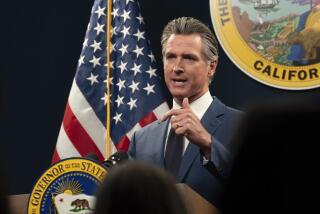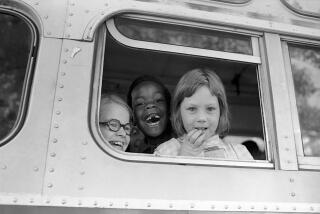The Voucher System: Simply Un-American
- Share via
Instituting a school voucher system would cripple public education. Voucher supporters argue that if public schools were forced to compete for their dollars by offering more effective programs than their competition, they would retool for success. But correcting weak areas in the system can’t be accomplished by financially gutting it.
What determines education’s end product? More than the curriculum, budget, school plant, or teaching staff, it’s the student walking through the school’s front door each morning, and his parents’ influence upon him and upon the system. From the perspective of a classroom teacher, my answer seems to have evaded many who lament public education’s shortcomings.
Make no mistake. I am not suggesting that students and their parents are exclusively responsible for the disappointments of public education. I simply wish to set the record straight, not just by adding them to the list, but placing them front and center--Exhibits A and B--high above any other considerations.
It’s time to listen to people in the front-line trenches directing our classrooms. Teachers will tell you that the paramount issues influencing successful learning outcomes are:
* Attitude: Students dedicated to exerting the effort necessary to acquire knowledge and skills.
* Behavior: Maintenance of a businesslike atmosphere in school, requiring conduct that does not detract from learning.
Private schools appear, in some instances, to achieve better results than their public counterparts. But private schools, unlike public schools, are not required by law to accept and educate all children.
Public schools have a mandate to include those with special needs: Youngsters with learning disabilities, those for whom English is not the first language, the mentally and physically disabled, as well as the socially and psychologically maladjusted. Programs to address the specific needs of these youngsters create a financial burden most private schools are able to avoid.
Unlike public schools, private schools, as in any business, must show a profit. They must provide expensive facilities, while public school plants are in place. In few instances would the cost of attending a private school be met by the state-issued voucher amount.
Those who argue for vouchers fail to address an interesting issue in the equation, one that muddies the waters: Throughout the country, court decisions relating to public education have suggested that, should vouchers become a fact, private schools that accept them would be required to take them from anyone. This being the case, substantial numbers of malcontents and students with behavior problems would take their vouchers outside the public school system. When a student whose attitude and behavior presents a constant challenge to the system joins the other voucher-carrying escapees, his problems move with him.
Finally, everyone who left public education in the mass voucher migration would find themselves facing the same environment they hoped to avoid--with the problem remaining unresolved. Again, the clientele and their parents dictate the outcome of any school’s efforts.
As a teacher, I’m particularly concerned that vouchers would skim many of the best students from public schools. They are role models essential to the mix because they aid in creating the desired mood among the school population for pursuing excellence and acquiring an education.
But it’s as a citizen of this uniquely founded nation that I am committed to defeating vouchers.
Most youngsters whose special needs require expensive programs--those physically, mentally and sociologically disabled--would remain within the public school system, as would most of the children of the poor. The cost to their families of augmenting the limited voucher dollars to the level of most private schools’ tuition would be prohibitive. This devastating shift in government policy would produce “separate” schools and, in effect, a stratum of “second-class” citizens.
I find that a divisive approach and totally unacceptable. It simply is not the American way.
Despite the trials, disappointments and constant top-to-bottom scrutiny, public education in the United States has much to be proud of. Our public school systems have been influential in producing individuals responsible for catapulting this nation to the moon.
Our graduates have played instrumental roles that have made computers and the Internet nearly as commonplace an indoor plumbing. Citizens of the United States have won more Nobel Prizes in science than those educated in any other country.
Let’s not kill the system with remedies that have us shooting ourselves in the foot. Rather, let us direct our energies toward returning our schools to the position they’ve traditionally enjoyed in America’s culture.
More to Read
Sign up for Essential California
The most important California stories and recommendations in your inbox every morning.
You may occasionally receive promotional content from the Los Angeles Times.













